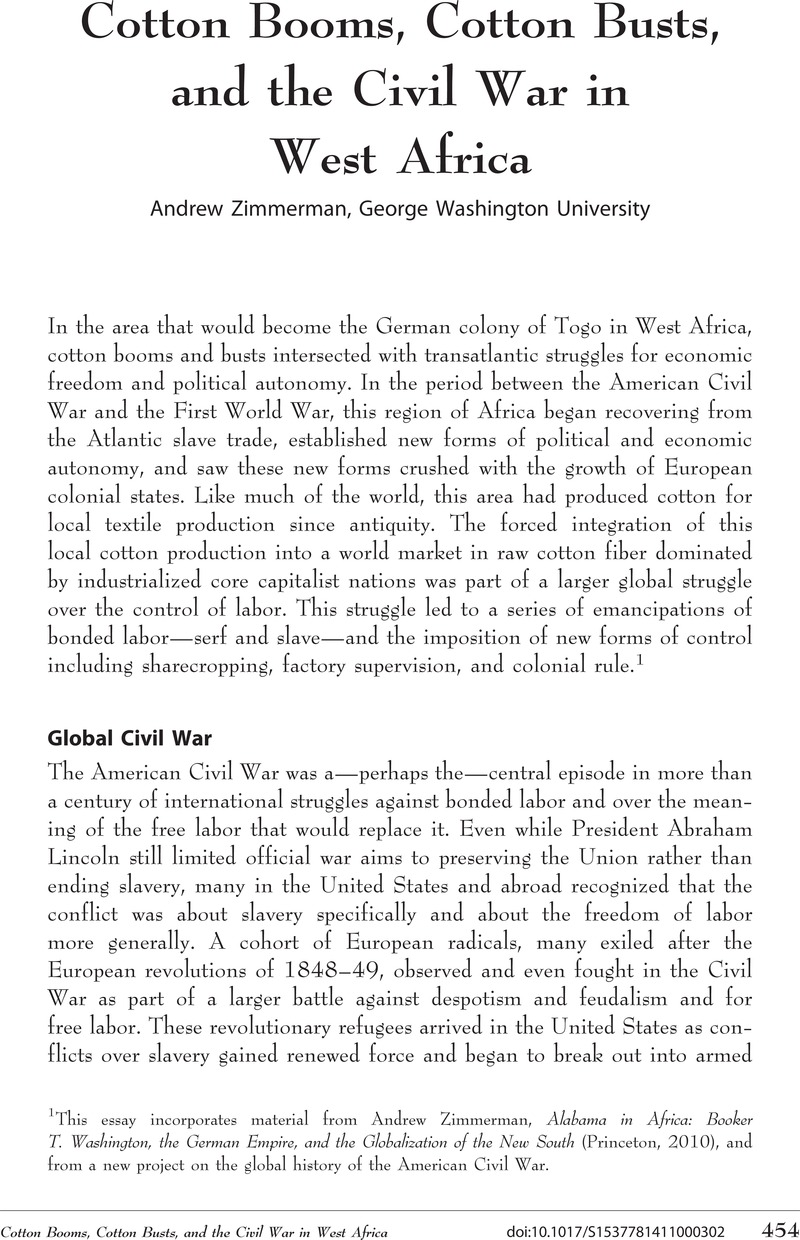No CrossRef data available.
Article contents
Cotton Booms, Cotton Busts, and the Civil War in West Africa
Published online by Cambridge University Press: 28 September 2011
Abstract

- Type
- Forum: Boom and Bust
- Information
- The Journal of the Gilded Age and Progressive Era , Volume 10 , Issue 4 , October 2011 , pp. 454 - 463
- Copyright
- Copyright © Society for Historians of the Gilded Age and Progressive Era 2011
References
1 This essay incorporates material from Zimmerman, Andrew, Alabama in Africa: Booker T. Washington, the German Empire, and the Globalization of the New South (Princeton, 2010)Google Scholar, and from a new project on the global history of the American Civil War.
2 Karl Marx to Friedrich Engels, Jan. 11, 1860, Gesamtausgabe (MEGA2) (Berlin, 1972), III/10, 152–53Google Scholar. Unless otherwise noted, all transtations are by the author.
3 Carey played a less central role in the three volumes of Capital itself, although Marx did invoke him as an example of economists who presented “the capitalist system of production” as “a system of ‘harmonies’ instead of antitheses.” Karl Marx, Capital, trans. Fernbach, David (New York, 1993), 3:759Google Scholar.
4 Karl Marx, “Address of the International Working Men's Association (Inaugural Address)” (London, Sept. 28, 1864), MEGA2 I/20, 3–12.
5 Beckert, Sven, “Emancipation and Empire: Reconstructing the Worldwide Web of Cotton Production in the Age of the American Civil War,” American Historical Review 109 (Dec. 2004): 1405–38CrossRefGoogle Scholar. See also Beckert's account of the Tuskegee expedition discussed below, “From Tuskegee to Togo: The Problem of Freedom in the Empire of Cotton,” Journal of American History 92 (Sept. 2005): 498–526CrossRefGoogle Scholar.
6 Foner, Eric, Reconstruction: America's Unfinished Revolution, 1863–1877 (New York, 1988), 555Google Scholar.
7 See Ferdinand Goldberg (in Klein Popo) to Auswärtigen Amt, Aug. 1, 1890 (copy), FA 1–332, Bl. 21–34, Togo National Archives [TNA]; and Goldberg, , “Der Baumwollbau in Togo, seine bisheringe Entwicklung und sein jetziger Stand,” Deutsches Kolonialblatt 22 (1911): 229–33, 282–87Google Scholar.
8 Georg Friedrich Knapp, “Landarbeiter und innere Kolonisation” (1893) in Knapp, Georg Friedrich, Einführung in einige Hauptgebiete der Nationalökonomie: Siebenundzwanzig Beiträge zur Sozialwissenschaft (Munich, 1925), 137Google Scholar.
9 Kautsky, Karl, Sozialismus und Kolonialpolitik: Eine Auseinandersetzung (Berlin, 1907), 18–20Google Scholar.
10 The best contemporary accounts of the political economy of this region from the German colonial period are Spieth, Jakob, Die Ewe-Stämme: Material zur Kunde des Ewe-Volkes in Deutsch-Togo (Berlin, 1906)CrossRefGoogle Scholar; and Westermann, Diedrich, Die Glidyi-Ewe in Togo: Züge aus ihrem Gesellschaftsleben (Berlin, 1935)Google Scholar.
11 On the West African palm oil trade, Lynn, Martin, Commerce and Economic Change in West Africa: The Palm Oil Trade in the Nineteenth Century (Cambridge, 1997)CrossRefGoogle Scholar.
12 This has led William Roger Louis to term Morel a “pro-German radical.” See Louis, William Roger, “Great Britain and German Expansion in Africa, 1884–1919” in Britain and Germany in Africa: Imperial Rivalry and Colonial Rule, eds. Gifford, Prosser and Louis, William Roger, with Alison Smith (New Haven, 1967), 35Google Scholar. Louis cites a letter from Morel to John Holt, Oct. 7, 1912. See also Cline, Catherine Ann, Introduction to E.D. Morel, Truth and the War (1916; New York, 1972)Google Scholar.
13 See, for example, “Herr Dernburg on German Rule and Prospects in Africa,” African Mail, Feb. 5, 1909, 171–72.
14 Beno von Herman to Booker T. Washington, Sept., 3 1900, in Booker T. Washington Papers, ed. Harlan, Louis (Urbana, 1972–89), 5:633–636Google Scholar.
15 Washington, Booker T., Vom Sklaven Empor: Eine Selbstbiographie, trans. Du Bois-Reymond, Estelle (Berlin, 1902), viGoogle Scholar.
16 KWK, “Baumwoll-Expedition nach Togo” (1900), FA 1–332, Bl. 88–102, TNA.
17 Rohrbach, Paul, Deutsche Kolonialwirtschaft: Kulturpolitische Grundsätze für die Rassen- und Missionsfragen (Berlin, 1909), 7, 13, 40–43Google Scholar.
18 John W. Robinson, Notsé, to Governor Zech, Dec. 12, 1904, FA 1/303, Bl. 255–258, TNA.
19 These figures are based on Governor Zech to the German Colonial Office, Nov. 23, 1909, R1001/8223, 155–160, Bundesarchiv, Berlin; Dunstan, Wyndham R., Report on the Present Position of Cotton Cultivation: Presented to the International Congress of Tropical Agriculture, Brussels, May 1910 (Paris, 1910), 46–47Google Scholar; and Penzer, N.M., Cotton in British West Africa, Including Togoland and the Cameroons (London, 1920)Google Scholar.
20 Marx, Capital, 1:279.




